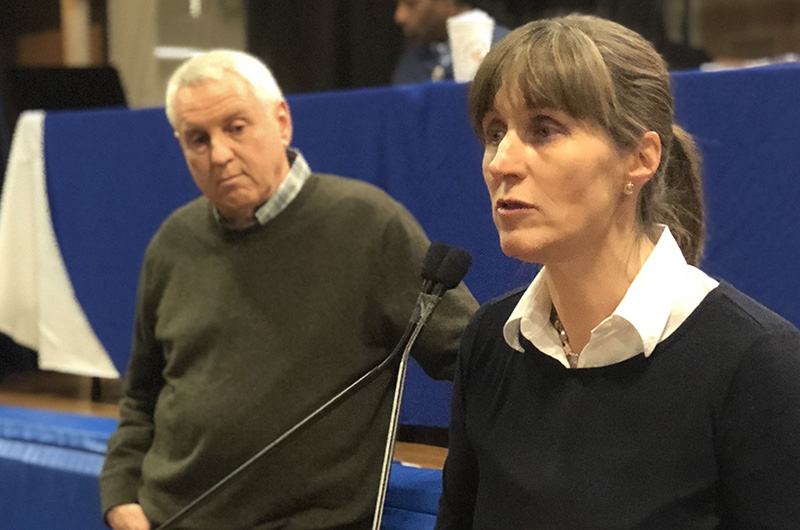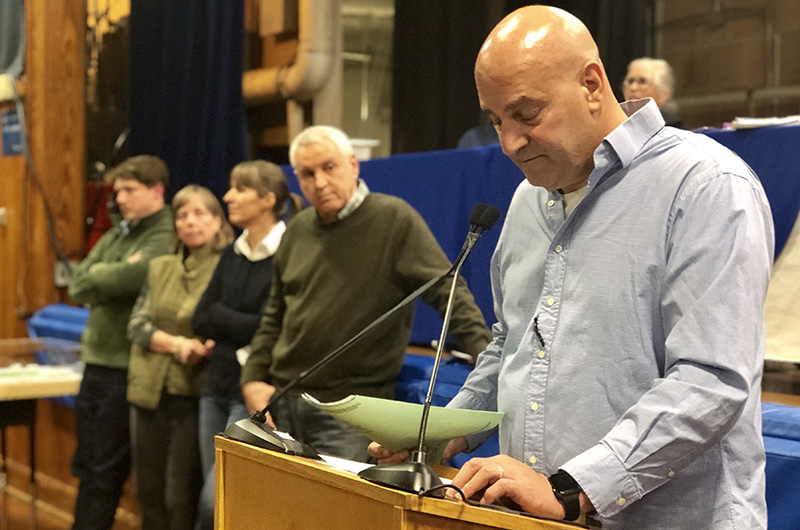After two nights of emotionally charged debate, Tisbury voters approved a $46.6 million plan to build a new town elementary school by a wide margin at their annual town meeting Wednesday.
The standing vote was 319 to 99, easily gaining a needed two-thirds majority to pass. The school question still needs approval in the ballot box on April 24, when voters will be asked to exclude the debt from the Proposition 2 1/2 state tax cap. A simple majority vote is needed.

If it is approved, the town will qualify for state reimbursement of about $14.6 million, leaving town taxpayers responsible for about $32 million.
On Wednesday school administrators, teachers, planners and supporters rejoiced in the vote that capped more than two years of planning and public discussion over the new school. Planning for the project has taken place under the umbrella of the Massachusetts School Building Authority.
“It’s very exciting,” Vineyard schools superintendent Matthew D’Andrea said. He praised the work and dedication of the school building committee, which has been led by Colleen McAndrews.
Speaking on the town meeting floor Wednesday night, Ms. McAndrews had one primary message.
“This is a town project,” she said. “This is not a school project.”
A single item on the 40-article annual town meeting warrant, the school spending article dominated the first two nights of the annual town meeting. The meeting reconvened for a third night on Thursday.
Moderator Deborah Medders presided; an overflow crowd of 407 voters attended on the first night, while 424 voters turned out on the second night.
On Tuesday night debate on the school question was peppered with skepticism. In a lengthy speech, planning board chairman Ben Robinson questioned the decision to build a new school on the existing site, arguing that renovation would be better for the town and the environment, and suggesting that the school building committee had not adequately vetted that option. “It is clear in my mind that the new construction option accomplishes very little to benefit our future, nor the education of our students,” Mr. Robinson said.
For some voters the hit to the town tax rate from the largest capital spending project in recent memory was the biggest sticking point.
“I do not see how we can incur [this] expense given our current operating expenses,” said Rachel Orr. “I can’t pay this bill.”
Selectman Tristan Israel also spoke against the school article. He pointed to the growing population of elderly residents as a pressing need for the town.
“We have other interests and needs in the community that we need to support,” he said.

But on Wednesday night supporters of the new school turned out in force to weigh in. Long lines formed at every microphone in the school gymnasium where the meeting was held.
Wiet Bacheller, a longtime town resident and retired teacher, compared the decision to the one made by the town in 1929 when the existing brick school was built.
“Tonight we are faced with having to make a similar decision,” she said, drawing applause.
John Sundman, whose three children attended the school, pointed to future generations.
“The world that they’re going to be inheriting is really different from the world we grew up in,” he said.
Finance committee chairman and school committee member Jeff Kristal added levity to a room threaded with tension. “The problem is I don’t even like kids. I like dogs, and I like my own kids, but others not so much,” he said, later adding: “We have delayed this desperately needed school building long enough.”
Rick Brew called the decision a middle ground. “This is a compromise choice,” he said, announcing that he would vote yes.
Voters had agreed to end debate by 9:30 p.m. — and the long-anticipated school question came to a standing vote.
The town selectmen were on the record as being divided, with Mr. Israel voting against and selectman Larry Gomez voting in favor of the new school. Selectman Melinda Loberg remained in her seat, abstaining from the vote altogether.
School principal John Custer, who attended the meeting with his father Herb Custer, former superintendent of Vineyard schools, expressed gratitude at voter support for the town school and also cautious optimism about the final outcome.
“I’m very pleased,” Mr. Custer said. “I’ve learned not to celebrate early but I’m hopeful for positive returns at the ballot. I’m very reassured and grateful.”
In other business Wednesday, voters approved a $27.9 million annual budget after a 30-minute discussion examining line items.
There was prolonged discussion about whether to contribute $9,165 to the county substance use prevention program.
Mr. Kristal spoke on behalf of the finance committee, which did not recommend the article.
“We find duplication of effort from other providers or other funding sources,” he said.
In the end the article passed on a voice vote.
On Tuesday night, voters made their way through a special town meeting warrant, approving all articles except one regulating rentals. That article was put on hold in light of a bill on Beacon Hill to regulate short-term rentals that could become law.
A home rule petition that would give the town more ability to regulate herbicide spraying was approved after discussion and multiple amendments. The petition will now go to the state legislature.
For the past two years Tisbury has opposed a program by the utility giant Eversource to spray beneath power lines, to no avail. The home rule petition is aimed at giving the town more control in the matter.
“We owe it to ourselves to our children and to our aquifer to keep trying,” Mr. Israel said.
Voters also approved a petition from Island students to ban the intentional release of helium balloons, agreed to establish a sewer district along the State Road business corridor and to establish a stabilization fund that pertains to upgrades the wastewater treatment plant.
The meeting continued Thursday night. The annual town election is April 24.









Comments (21)
Comments
Comment policy »